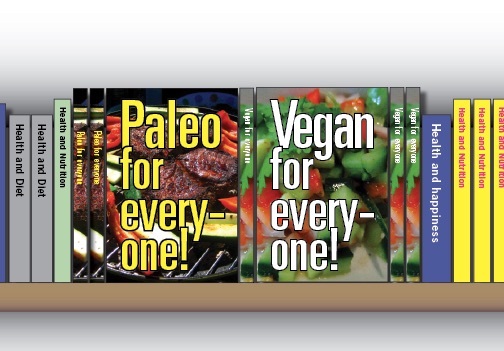

Article
You're different...

I recently saw two books, side-by-side, at my local bookstore.
The Paleo diet book declared, and “proved” that everyone should eat meat.
The Vegan diet book declared, and “proved” that no one should eat meat.
I remember thinking at the time, “How is it both of them BELIEVE they are right?”
It might be due to errors in critical thinking.
For example:
-
•believing ONE diet is appropriate for everyone – no matter their heredity or unique biochemistry
-
•looking for evidence that supports their point of view – and ignoring evidence that does not
The reality is that everyone is NOT the same.
And that needs to be considered when it comes to people's needs regarding diet, nutrition, and lifestyle.
Key ways people are NOT the same:
(things to consider when working on health issues)

-
•ancestry
– inherited body strengths and weaknesses
– ancestral food preferences -
•health of parents at conception
-
•quality of nutrition in womb
-
•chemical exposures in womb
-
•duration of breast-feeding (imparts digestive and immune health)
-
•polymophisms (genetic variations) that impart disadvantages

-
•nutritional deficiencies (existing)
-
•digestive deficiencies and issues
– capacity to make stomach acid, bile,
enzymes
– bacterial balance in digestive tract
-
•body composition
(fat and muscle amounts – current, past)
-
•toxin exposure
– environmental: heavy metals, chemicals
– home: food additives, pesticides,
hormones, household cleaners, plastics
residues
-
•detoxification deficiencies
-
•infections, parasites, candida, dental
-
•allergies – food, environment
-
•sleep – duration, quality
-
•imbalances:
–hormone and neurotransmitter imbalances
(insulin, leptin, estrogen, thyroid, cortisol)
– immune system imbalances (over, under)
– inflammation (chronic)
-
•stressful situations and experiences
-
•trauma – physical and emotional
-
•self-esteem issues (has positive/negative influence on actions)
-
•medical treatments

-
•food consumption – type, quantity, quality
-
•water intake
-
•antioxidant intake
-
•exercise amount
-
•job/career – like, dislike, stressful, fulfilling
-
•alcohol
-
•smoking
-
•stimulants
-
•medication use
(and associated nutrient depletions)
-
•ongoing toxin exposure
-
•rest and relaxation – presence/absence
-
•environment – light, fresh air, peacefulness
-
•sun exposure (or lack of)
-
•location – current vs where their ancestors lived
-
•attitude (positive/negative)
-
•spirituality, connectedness
-
•social involvement
-
•family support
Some, or all of these differences can contribute to why people have different needs for diet, lifestyle, and health protocols – and why what works for one person may not work for another.
Thinking about what makes people different from each other is a good example of critical thinking – and one way critical thinking can be used to make more effective health decisions.
Home | Holistic Nutrition | Talks and workshops | Contact | Articles and recipes

© 2020 Paul Demeda | 2869 Bloor Street West | Toronto, ON M8X 1B3, Canada
